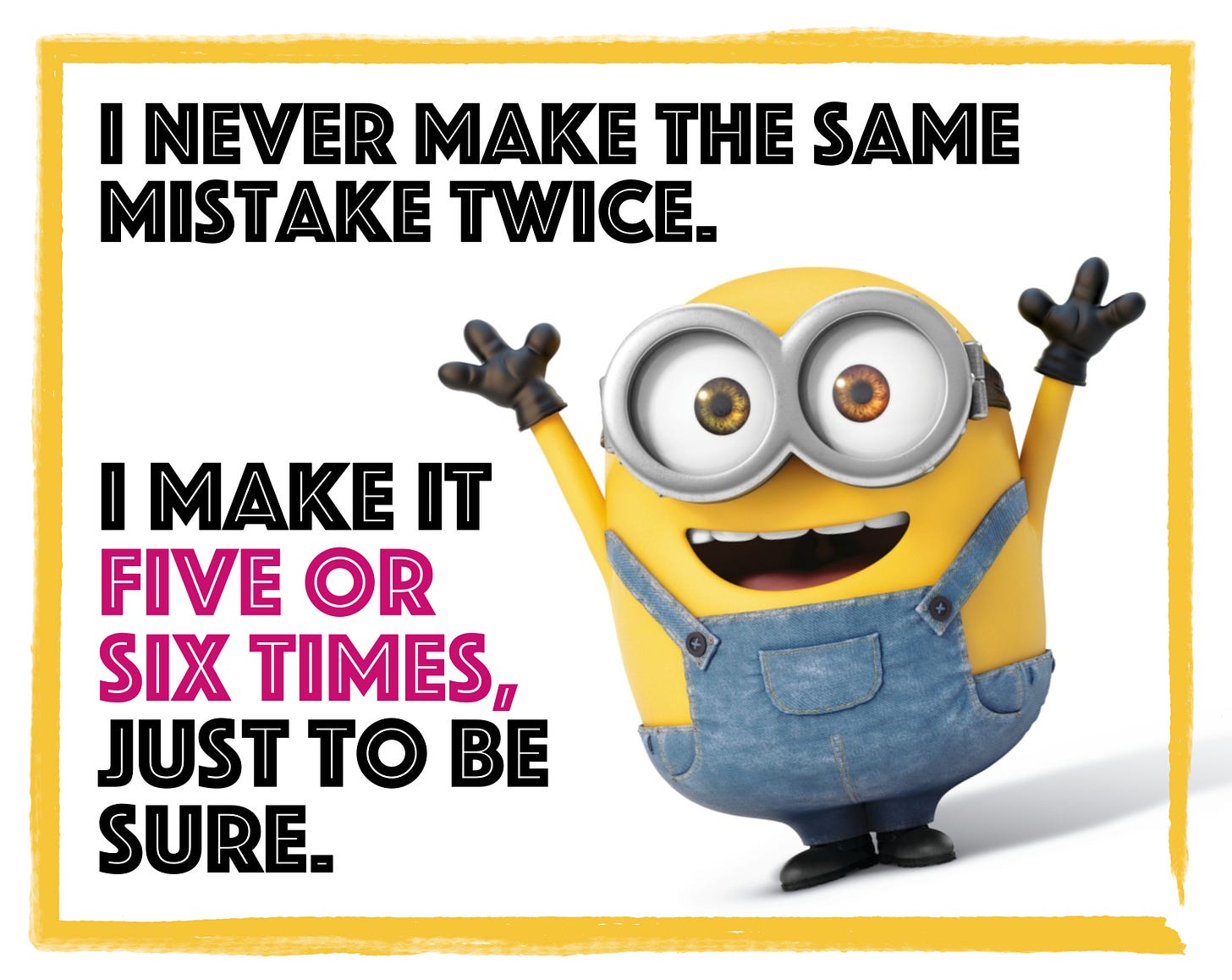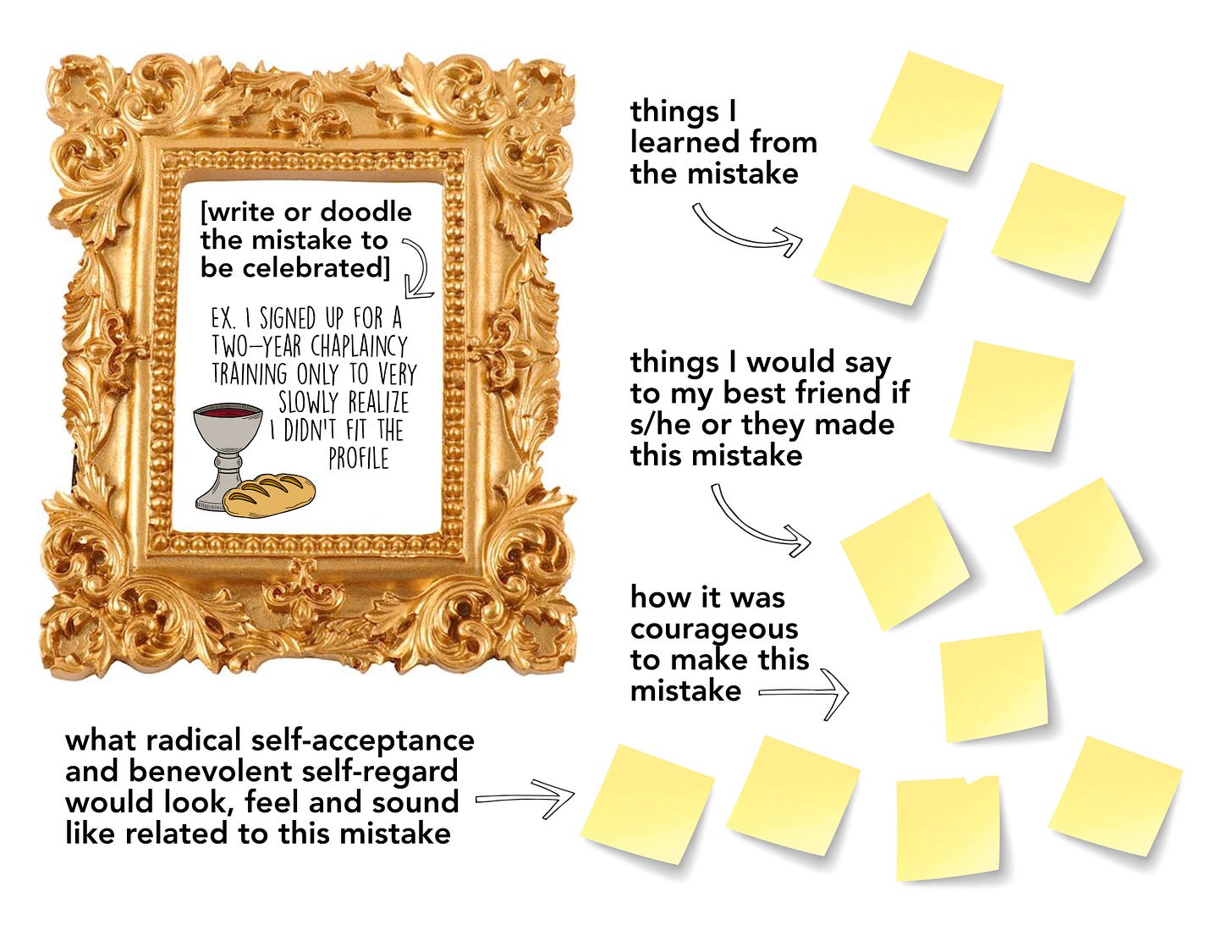mistake celebration
a game of joyful buffoonery
Dear Reader: This is Letter 1 of 6 in collaboration with Jose Manuel Redondo Lopera, who shares my passion for facilitation. José and I chose the category ‘Games for Personal Development’ as an exchange to enliven each other’s practice, and hopefully nourish meaningful moments in your life.
______________________________
Dear José - my exuberant facilitation colleague,
Most people don’t know I have a life motto, but I do. It’s a Japanese expression tucked in a book of the Shōbōgenzō and in non-kanji form it reads as shoshaku jushaku: one continuous mistake.
I adopted this expression as the motto of my life not only because it startles and confounds the Western mind (a mind I also have) but because I’ve lived purposeful mistake-making for many moons now. This isn’t because I was born with a penchant for blithe spontaneity. Not at all. Like most of us with colonized minds I’m a recovering perfectionist, but I got baptized into the art of one continuous mistake because ALL of my career paths - graphic recording, game facilitation, visual thinking, collaboration design, entrepreneurship, writing, public speaking, and Zen - not only involve mistakes, they actually require them to be good.
Now you know and I know that most of us spend the entirety of our lives avoiding, ignoring, denying, hiding, or rationalizing mistakes, so loving them feels counter-intuitive, and here I am inviting you to play a game CELEBRATING them, which is a whole other ascent into the upside-down world. But there are reasons why I invite people to make mistakes - a process I lovingly refer to as productive discomfort - and those go beyond our facilitator focus on team-building and problem-solving, innovating and strategy-refining.
Why I ask people to make mistakes is because mistake-making is an elixir for potentiation. What I mean is:
Making mistakes means we’re experimenting or prototyping, taking a risk, and learning something. This is psychologically HEALTHY.
Making mistakes in front of other people (god forbid) means we’re becoming increasingly less concerned with other peoples’ views of us. This, too, is HEALTHY. (Unless you have narcissistic tendencies in which case it’s maladaptive, but that’s a different post.)
Making mistakes shows we’re not confident we can get the outcomes we want, but we are confident we can bounce back when things go sideways. Building this resilience is HEALTHY.
Making mistakes means there’s enough psychological safety IN OUR OWN HEADS to try things that scare us. It means our internal landscapes have enough benevolent regard that we can trust we won’t eviscerate ourselves when we do something imperfectly. Our inner naysayers will likely show up, but choice-driven mistake-making means they’re not running the show, terrorizing us out of living a wholehearted life.
Last, let’s imagine that Courage = COMMITMENT + DOUBT + ACTION. Making mistakes helps us remember - at an embodied level - that we have a natural capacity to rise to an occasion, so courageous efforts summon and fortify a vow to leave the cocoons of our life.
If you want to see me and my team making mistakes in real time, you should watch our opening show on Collaborative Intelligence. I’ve never seen such a display of unintended buffoonery for an inaugural event. My team and I flamed out large and in charge in front of almost 300 people on the Interwebs, and I can say with sincerity that it didn’t cause me distress. I promise you, José. I didn’t spiral into shame, plunge into rumination. I didn’t lose a minute of sleep. It did stress out my events team (who were absolutely not at fault), but the two improvisational facilitators - me and Patti Dobrowolski - we just rolled, sorting out the sh*t show with radical collaboration, good humor, and a sustained mission focus. No matter what mixture of empathy, rubber-neckery, or schadenfreude the audience experienced, the Adaptability Quotient of Patti and I was sky f*cking high and, in my view, that’s one mark of an elite facilitation athlete. Since you’re in this arena, you know what I mean. Which leads me to the game I want to share with you today called Mistake Celebration. It’s a game that puts our bloopers on a pedestal on purpose. In solidarity with others, we declare our mistakes, own them, learn from them, work to accept ourselves for them, and celebrate them as the tools of transformation that they are.
Below is an example of a game space for this. FYI, when I share visual templates, it’s in the spirit of you creating your own version in the myriad ways you can do that. If some visual element or structure needs to be specifically designed so the game can run properly, I’ll let you know. For now, this does the trick.
MISTAKE CELEBRATION GUIDANCE AND MECHANICS:
This game is VERY BEST played among a circle of friends and/or trusted colleagues. You can play it solo, but the celebration part of the game is pivotal for empathetic joy generated in circle. In a container of celebration, players mutually demonstrate acceptance, affirmation and support, and this catalyzes recovery from human error. It invites compassion. And off we go.
Identify a mistake you made. Since this is a social game, you decide the level of openness you’re available for. But try not to choose something that has zero risk. Typically, the more courageous your choice is, the more connective this game becomes.
Draw a swanky frame to indicate the prestige and loftiness of this mistake. If you’re working in a digital collaboration environment, import an image but make it posh. We’re paying homage to our mistakes so please, use frames that would fit on the walls of the Versailles Palace.
Write and/or doodle your mistake in the frame. You can use words, images, symbols, numbers, abstract marks, colors, etc. Do combine visual language with written language for clarity.
Take between 5 - 15 minutes to respond to the first three inquiries surrounding the frame. Hold the question about radical self-acceptance until later.
Come together in circle and let someone volunteer to open. That person can show her visual or not, but as soon as she reads her mistake out loud everyone in the circle EXPLODES IN APPLAUSE. The job of the other players is to celebrate like they’ve just seen an elephant sing opera. Clap, stomp, whistle, snap, yell out encouraging things like “You’re one of a kind!” and “You’ve got this!” Don’t hold back. (Relevant: This will land emotionally differently for different players and it’s instructive for players to note the internal experience of being celebrated for not being perfect.)
The player who opened the game can take 2 - 5 minutes speaking to her insights around the three initial prompts. She can share any level of detail and elaborate however she’d like.
The player who follows the opening player should be one who’s moved by her story. This is more a campfire and less an assignment in numeric sequence. Being moved to share gives the game momentum, and that spirit is sustained until the last player has spoken.
Players return to their game space and respond to the last question about what radical acceptance and benevolent self-regard could look and sound like. This may not come easy since most people are exquisitely hard on ourselves, but each player takes 2 - 4 minutes to try.
The player who first opened opens again and shares her perspective on this question. As in Round 1, whomever is moved to speak after her share does so. This round is valuable because players collectively paint a picture of what self-compassion might look like in various forms. That, in itself, can be a revelation and again, it offers players insight into internal discomfort around being a messy miracle.
After the last player has spoken in this second round, close with another round of applause and a gesture of appreciation to each other. Put both hands on your heart, blow each other kisses, hug yourself and others, bow respectfully, doodle a sacred heart on a sticky note and hold it up, etc.
When played with trusted others, Mistake Celebration does so much good. It can discharge pent-up energy around a difficult misstep, reframe what was previously a fixed view of wrongness, endear players to each other in ways that weren’t possible before, and invite a worldview in which self-compassion is not self-indulgent but is instead a move toward mental strength. I LOVE this game for its shared vulnerability and self-discovery and I encourage you to integrate mistake celebration into your life and work.
José, I want you to know that I chose my life motto with clear eyes and a full heart, because I know without doubt that celebrating mistakes is a tried-and-true path to flourishing. Why would we commit to anything else?
I look forward to learning from you.
Sun







I just love this game. It requires trust to be built but it can be so powerful.
As Brené Brown beautifully and eloquently says, as long as we integrate not just the highs but the lows, there lies our beauty as persons and as a team.
Thanks for this.